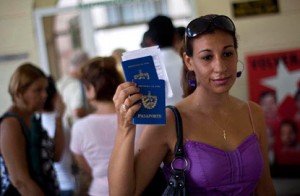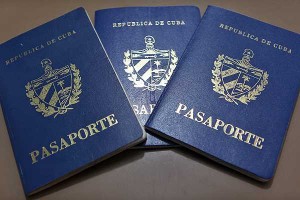Cuba will allow its citizens to travel as emigrants and even benefit the Cuban Adjustment Act (CAA) in the United States without losing their rights as residents of the island within two years, a senior government official.
Colonel Fraga Lamberto Hernández, deputy chief of the Immigration and Nationality Directorate (IND) of the Ministry of Interior, said that with the entry of immigration reform, on 14 January, Cubans may stay for 24 months abroad, obtain residency or citizenship in other countries, and even benefit from immigration privileges on American soil, and to return to Cuba without any additional requirements for admission.
“Although your visa to emigrate, you temporarily travel up to 24 months,” Fraga said on Tuesday on the television program Al law. “The condition emigrated from Cuba visa does not give the person receives, but his pesonal decision to remain outside the country for more than 24 months.”
Although the decrees and regulations of immigration policy, announced on October 16, contain the legal alternative, is the first time a Cuban official openly reports on the scope of these measures for those traveling to the United States.
Nonexclusive categories
The colonel added that from next Monday the nationals will have three categories migratory (resident in Cuba, immigrants and foreign residents with permit issued), but none is exclusive of the other.
“It may even be cases coming into the United States and eligible asked Adjustment Act that have them [CAA], you have to wait a year and a day … In these cases, the person may be resident in the country where you are or where you fit in the case of the United States, and maintain their residence in Cuba, “he said Fraga.
He said there will be a losing cause for the person Cuban residence acquire residence in another country or even obtaining a foreign citizenship.
The issue of permanent residence under the CAA is of great interest to many Cubans that not only could reach U.S. territory legally, but also use a third Latin American country as a springboard to then go through the Mexican border.
According to statistics from the Department of Customs and Border Protection, 9.191 Cubans entered U.S. territory from border points in fiscal 2012, of which 8.273 across the Mexican border. Since the signing of the bilateral migration accords of 1995, more than 447,000 Cubans have obtained legal residency in the United States.
Under the provisions Cuban, from the time of departure the person will enjoy 24 months of stay abroad or extension without any payment for this stay. When exhausted this period may apply for extension of their stay or become an emigre.
Valid passports be updated
“If the person runs 24 months and returns, may back out and enjoy another 24 months when you want,” he said.
Fraga Clarifications occur on the eve of the entry into force of immigration reform, which has created many expectations among the Cuban population at the prospect of being able to travel abroad without permission, only to get a passport.
In recent days, the Cuban media have answered many questions from people, eager to know their options as of January 14. The tonic government seems open to maximize flexibility in the alternatives offered by the law and provide a more efficient service to potential travelers.
Fraga also announced that as part of the streamlining of procedures, people who have a passport issued before January 14 will no longer have to appear in government offices to update, as initially reported to the population.
He mentioned that from a job that has been pre desarollando date, there have been updating all passports of persons aged 18 years and there is no need to bother to appear with its documents to the immigration authorities.
“As of January 14 all over 18, their passports will be automatically updated and [its carriers] will be able to travel,” said the official.
Exception for minors
For children under 18 years if necessary to make the upgrade process, by the appearance of the father and the mother to express the will of both the minor obtained the passport. The update will be to put a security seal to the document and will remain in effect until expressly revoked by one of his tutors.
Some young children, aged 17 to 19 years have travel restrictions due to the provisions relating to the recruitment and military service.
Fraga also referred to the situation of people who will travel abroad when the force between immigration reform.
Those who have not finished their stay abroad on January 14 will continue it until 24 months without extension, counting from the date they left the country. Who are established in the permit expires 11 months before next Monday will address a Cuban consulate to request an extension of their stay and can stay up to 24 months abroad, always taking as reference the day of departure from the territory national.
As for obtaining new passports, the official said that the amount of 100 convertible pesos (CUC) will be paid when ready and to be delivered to the owner. will be valid for six years and must be renewed every two, with a total of 20 CUC.
Fraga Lamberto Statements for the program to right:
Sources: CafeFuerte/AlDerecho/YouTube/InternetPhoto/www.theCubanHistory.com
Cubans can live in U.S. without losing residence on the island/ The Cuban History/ Arnoldo Varona, Editor
Cubanos podrán vivir en EU sin perder residencia en la isla
Cuba permitirá que sus ciudadanos puedan viajar como emigrados y acogerse incluso a la Ley de Ajuste Cubano (CAA) en Estados Unidos sin perder sus derechos como residentes de la isla en un plazo de dos años, anunció un alto funcionario gubernamental.
El coronel Lamberto Fraga Hernández, segundo jefe de la Dirección de Inmigración y Extranjería (DIE) del Ministerio del Interior, dijo que con la entrada de la reforma migratoria, el próximo 14 de enero, los cubanos podrán permanecer por 24 meses en el extranjero, obtener residencia o ciudadanía en otros países, e incluso beneficiarse de los privilegios migratorios en territorio estadounidense, y poder regresar a Cuba sin ningún requisito adicional de ingreso.
“Aunque su visa sea para emigrar, usted viajará de forma temporal hasta un máximo de 24 meses”, explicó Fraga este martes en el programa televisivo Al Derecho. “La condición de emigrado de Cuba no la da la visa que la persona reciba, sino su decisión pesonal de permanecer fuera del país por más de 24 meses”.
A pesar de que los decretos y regulaciones de la política migratoria -anunciada el pasado 16 de octubre- contienen esa alternativa legal, es la primera vez que un funcionario cubano informa abiertamente sobre el alcance de estas medidas para los que viajan a Estados Unidos.
Categorías no excluyentes
El coronel agregó que a partir del próximo lunes los ciudadanos nacionales contarán con tres categorías migratorias (residentes en Cuba, emigrados y residentes en el exterior con permiso extendido), pero ninguna es excluyente de la otra.
“Puede que incluso sea de los casos que llegan a Estados Unidos y piden acogerse a esa Ley de Ajuste que tienen ellos [CAA], que tienen que esperar un año y un día… En estos casos la persona podrá tener residencia en el país donde esté o donde se ajuste, en el caso de Estados Unidos, y mantener su residencia en Cuba”, enfatizó Fraga.
Agregó que no será una causal para perder la residencia cubana que la persona adquiera residencia en otro país o incluso que obtenga una ciudadanía extranjera.
El tema de la residencia permanente bajo la CAA es de sumo interés para numerosos cubanos que no solo pudieran llegar legalmente a territorio estadounidense, sino también utilizar un tercer país latinoamericano como trampolín para luego entrar a través de la frontera mexicana.
De acuerdo con estadísticas del Departamento de Aduanas y Protección de Fronteras, 9,191 cubanos ingresaron a territorio estadounidense desde puntos fronterizos en el año fiscal 2012, de ellos 8,273 a través de la frontera mexicana. Desde la firma de los acuerdos migratorios bilaterales de 1995, más de 447 mil cubanos han obtenido la residencia legal en Estados Unidos.
Según las disposiciones cubanas, a partir del momento de salida del país la persona disfrutará de 24 meses de permanencia en el exterior sin necesidad de prórroga ni ningún tipo de pago por esta estancia. Al agotarse este período podrá solicitar la extensión de su permanencia o convertirse en un emigrado.
No habrá que actualizar pasaportes vigentes
“Si la persona agota los 24 meses y regresa, podrá volver a salir y disfrutar de otros 24 meses cuando quiera”, indicó.
Las aclaraciones de Fraga se producen en vísperas de la entrada en vigor de la reforma migratoria, que ha generado múltiples expectativas entre la población cubana ante la posibilidad de poder viajar al extranjero sin solicitar permiso, solo con la obtención del pasaporte.
En los últimos días, los medios cubanos han respondido numerosas interrogantes de la población, ávida de conocer sus opciones a partir del 14 de enero. La tónica gubernamental parece abierta a flexibilizar al máximo las alternativas que ofrece la ley y brindar un servicio más eficiente a los potenciales viajeros.
Fraga anunció también que como parte de la agilización de trámites, las personas que tengan su pasaporte emitido antes del 14 de enero ya no tendrán que comparecer en las oficinas gubernamentales para actualizarlo, como inicialmente se había informado a la población.
Mencionó que a partir de un trabajo que se ha venido desarollando previo a la fecha, se han logrado actualizar todos los pasaportes de personas mayores de 18 años, y no habrá necesidad de molestarlas para que comparezcan con sus documentos ante las autoridades de Inmigración.
“A partir del 14 de enero todos los mayores de 18 años, automáticamente sus pasaportes estarán actualizados y [sus portadores] estarán en capacidad para viajar”, aseveró el oficial.
Excepción para menores
En el caso de los menores de 18 años sí se hará necesario hacer el proceso de actualización, mediante la comparecencia del padre y la madre para expresar la voluntad de ambos de que el menor obtenga el pasaporte. La actualización consistirá en colocarle un sello de seguridad al documento y se mantendrá vigente hasta que sea revocada expresamente por alguno de sus tutores.
Algunos jóvenes comprendidos en las edades de 17 a 19 años tendrán limitaciones para viajar debido a las disposiciones relacionadas con el reclutamiento y la prestación del servicio militar.
Fraga se refirió asimismo a la situación de personas que estarán de viaje en el exterior cuando entre el vigor la reforma migratoria.
Los que no hayan concluido la estancia en el exterior el 14 de enero podrán continuarla hasta los 24 meses sin necesidad de prórroga, contando a partir de la fecha que salieron del país. A quienes se les agote el permiso establecido de 11 meses antes del lunes próximo deberá dirigirse a un Consulado cubano a pedir una extensión de su permanencia y podrá quedarse en el exterior hasta 24 meses, siempre tomando como punto de referencia el día de salida del territorio nacional.
En cuanto a la obtención de nuevos pasaportes, el funcionario dijo que el importe de 100 pesos convertibles (CUC) se pagará cuando esté listo y le sea entregado al titular. será valido por seis años y habrá que renovarlo cada dos, con un importe de 20 CUC.
Declaraciones de Lamberto Fraga para el programa Al Derecho:
Sources: CafeFuerte/AlDerecho/YouTube/InternetPhoto/www.theCubanHistory.com
Cubans can live in U.S. without losing residence on the island/ The Cuban History/ Arnoldo Varona, Editor






